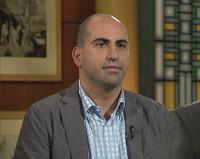
Phyllis Wise
(from USA Today)
about her decision to rescind a job offer to a would-be professor who had criticized Israel in statements on social media.
Chancellor Phyllis Wise's decision to step down last Thursday is the latest chapter in the story of Stephen Salaita, who was offered a faculty position in UI's Department of American Indian Studies only to have it withdrawn when university boosters complained about his statements on Twitter regarding Israel's actions in the Gaza Strip.
UI released 1,100 e-mails last Friday involving the Salaita case and other sensitive campus matters. The evidence showed that senior university administrators, including Wise, had used personal e-mail accounts in an apparent effort to avoid public scrutiny.
Salaita, a Palestinian-American who previously taught at Virginia Tech, filed a lawsuit that now looks like it could be headed to a federal jury, possibly inflicting more embarrassment and financial pain on the university; UI already has spent $843,000 to defend the lawsuit. Professors around the country have criticized UI's actions in the Salaita case, calling it an infringement on academic freedom of speech. Now we have evidence that the university's chief executive and others were using private e-mail accounts to hide communications from those who might seek their release under public-records laws.
How ugly, and expensive, will this get for the University of Illinois? That remains to be seen, but the Salaita case is emitting the kind of foul odor that arose in May 2008 when I was unlawfully terminated from the publications office at University of Alabama at Birmingham (UAB), after almost 20 years on the job. As I've reported numerous times here, e-mails and other forms of internal (and external) communications almost certainly would reveal who caused my termination and why.
The public record shows that I did not engage in any misconduct or policy violations that remotely would have merited termination--in fact, UAB's own grievance committee found I should not have been terminated, but former director of human resources Cheryl E.H. Locke and former president Carol Garrison upheld my firing anyway. This indicates someone--much like the Illinois boosters who complained about Salaita's tweets--was uncomfortable with my reporting on this blog about the prosecution of former Alabama governor Don Siegelman.

Stephen Salaita
(from Chicago Tonight)
In other words, I was fired because my reporting, which proved to be accurate and way ahead of its time, showed that a federal judge was corrupt and unfit to sit on the bench. There is little doubt that someone connected to former Republican governor Bob Riley engineered my firing because Fuller's unlawful actions were designed to destroy Riley's chief political opponent, Don Siegelman.
The entire country now knows my reporting about Fuller--done on my own time, with my own resources--was on target. But I'm still out of a job. Never mind that I was a government employee, and my speech, like Stephen Salaita's, was protected under the First Amendment.
UAB "caught a break" when my federal lawsuit just happened to fall in the lap of U.S. Judge William M. Acker Jr., an 87-year-old Reagan appointee who told me in open court that he was going to cheat me. Acker then did just that by violating black-letter law to grant the university summary judgment, even though no discovery had been conducted in the case--and no discovery schedule had been set. I notified the court in three separate motions that discovery was outstanding (in fact, it hadn't been conducted at all), but Acker dismissed my case anyway--and that ensured any UAB e-mails that would have proven my case remained under wraps, not unlike the way Chancellor Wise tried to do it at the University of Illinois. The U.S. Eleventh Circuit Court of Appeals upheld Acker's bogus rulings in a "Do Not Publish" opinion that violated its own long-standing precedents.
U.S. Judge Harry D. Leinenweber is hearing Salaita's case, and Leinenweber apparently takes his oath to uphold the law at least somewhat seriously. He already has ruled that UI had contractual obligations when it offered Salaita a faculty position. That means Chancellor Wise's resignation could be just the first of many embarrassments for UI. It means large chunks of taxpayer dollars--plus funds from the university's insurers--could be paid to settle a dispute that never should have happened in the first place. And it means that Stephen Salaita, if he wants to, likely will be gainfully employed at UI long after the administrators and boosters who tried to cheat him have come and gone.
How have UI's actions against Salaita been viewed in academia? Not well, according to a report in the Chicago Tribune:
The harshest criticism against Wise focused on the decision last summer to withdraw a job offer to professor Steven Salaita after he made a series of critical and profane comments about Israel on social media. U. of I. rescinded Salaita's offer for a tenured faculty position in the American Indian studies department weeks before he was scheduled to start teaching.
That decision led to much fallout, including a recent censure by the American Association of University Professors, a prominent professors group, which said U. of I. violated the principles of academic freedom. More than a dozen U. of I. academic departments voted no confidence in Wise's leadership, and faculty across the country have boycotted the campus and canceled events there. Salaita has filed a federal lawsuit alleging breach of contract and violation of his free speech rights.
What does the Salaita case teach us about the UAB cheat job that cost me my career? It's too early to say for sure; the Salaita case remains a long way from a trial date. But this much seems clear: Chancellor Wise's downfall started when several unnamed individuals sought e-mails and other documents under Illinois' Freedom of Information law. In fact, Salaita has filed a state-court lawsuit alleging that UI violated the state's open records law.
Alabama has a similar law--the Alabama Open Records Law--and it's designed to shine light on the communications of public employees in their official positions. That would include UAB employees, perhaps including one or more trustees, who signed off on my termination.
Such an open-records request spelled doom for Chancellor Wise's administrative career at UI. Perhaps a similar request in my case will cause heads to roll at the University of Alabama.
